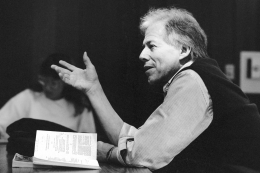To read the complete text of The Critical World of Harry Berger, Jr.: an Oral History (University of California Escholarship platform). Includes complete audio (streaming or download) for the oral history. Note: Due to editing by the narrator and the Project, there may be minor differences between the audio recording and the transcript. Please quote from the transcript as the record and not the audio. Audio will be found under "Supporting Material."
Interviewed by Cameron Vanderscoff
Edited by Cameron Vanderscoff and Irene Reti
74 pages, 2015
Photo by Shmuel Thaler. Courtesy of UCSC Library, Special Collections and Archives
 Harry Berger, Jr.’s oral history is an account of his perspective as a professor of literature, founding faculty member at the University of California, Santa Cruz, and literary critic. Throughout, he traces the parallel tracks of his pedagogy, campus engagement, and scholarship, considering points of intersection and core philosophies, addressing themes of change, conflict and continuity at UCSC. Berger defines himself as a critic above all else, and his training in New Criticism, with its trademark methodology of close reading, proves to be a consistent note both in his writing and in his approach to teaching and working at UCSC. After providing an overview of his early biography, discussing life in New York City and New Rochelle, he turns to his two loci at UCSC, Cowell College and the literature department. At the former, he was a teacher and dedicated participant in the original UCSC collegiate experiment, and at the latter, he was a passionate advocate of close reading as a core value for the new program. He applies close scrutiny to both entities, commenting candidly on the internal debates of the department, the styles and personas of his colleagues, and his own teaching in the college. Berger applies a nuanced take to the UCSC institution as a whole, commenting on the shift of the school away from its original collegiate model but rejecting the nostalgia of the “golden agers who think everything was better back then.” In lieu of a narrative of decline or departure, he posits an ongoing growth of UCSC with a continuity of quality in faculty and students alike, and where it remains, occasional conflicts notwithstanding, “a wonderful place.”
Harry Berger, Jr.’s oral history is an account of his perspective as a professor of literature, founding faculty member at the University of California, Santa Cruz, and literary critic. Throughout, he traces the parallel tracks of his pedagogy, campus engagement, and scholarship, considering points of intersection and core philosophies, addressing themes of change, conflict and continuity at UCSC. Berger defines himself as a critic above all else, and his training in New Criticism, with its trademark methodology of close reading, proves to be a consistent note both in his writing and in his approach to teaching and working at UCSC. After providing an overview of his early biography, discussing life in New York City and New Rochelle, he turns to his two loci at UCSC, Cowell College and the literature department. At the former, he was a teacher and dedicated participant in the original UCSC collegiate experiment, and at the latter, he was a passionate advocate of close reading as a core value for the new program. He applies close scrutiny to both entities, commenting candidly on the internal debates of the department, the styles and personas of his colleagues, and his own teaching in the college. Berger applies a nuanced take to the UCSC institution as a whole, commenting on the shift of the school away from its original collegiate model but rejecting the nostalgia of the “golden agers who think everything was better back then.” In lieu of a narrative of decline or departure, he posits an ongoing growth of UCSC with a continuity of quality in faculty and students alike, and where it remains, occasional conflicts notwithstanding, “a wonderful place.”

 Santa Cruz, CA
Santa Cruz, CA



